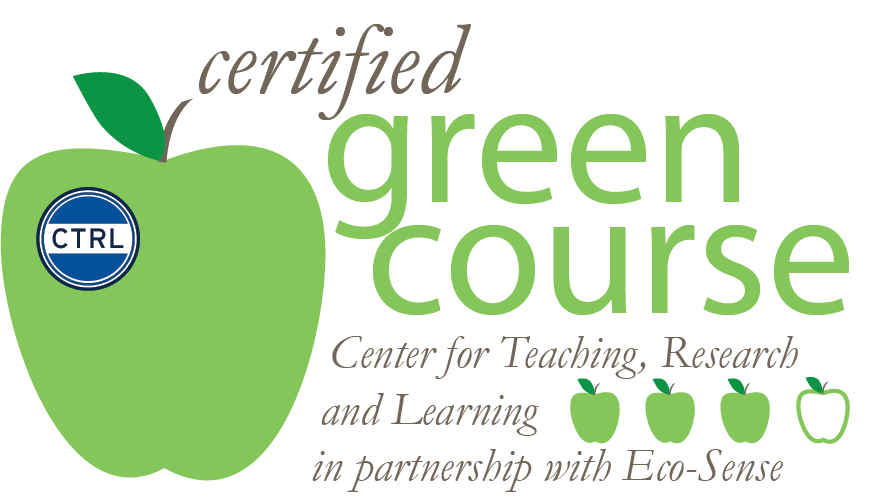Green Tips and Resources
Innovative Tips and Ideas from AU’s Green Teachers

Examples
Tips and Ideas
These are some of the innovative things for which certified faculty were rewarded with bonus points:
Reducing Paper Use | Saving Energy | Reducing Emissions | Other Measures
Reducing Paper Use
- Choose a textbook that can be purchased or accessed through the library as an e-book
- Give students the option to use MySpanishLab online for homework exercises instead of using the paper workbook that is sold with the text. This should allow them to resell the workbook in new condition.
- Review answers with students in class rather than requiring them to buy the answer key book
- Use the textbook “Web Page” instead of a printed Manual for the students to do their homework.
- Ask students from previous classes to post ads on Craigslist in order to sell their used textbooks; then tell new students to go check Craigslist to purchase the books.
- Let student use laptops during group exercises in class to type and send each other responses
- Post all class notes on Blackboard for students to annotate during class using their laptops
- Encourage students to “note share” on Blackboard
- When completing the library training, ask the assigned reference librarian to show students how to save and organize research without printing out hard copies of articles, clippings, etc.
- Recommend to the Writing Center that tutors ask students to submit electronic copies of papers to conference, rather than bringing hard copies in to their consultations.
- Use Google Forms to have students sign up for their volunteer times
- Change an activity that usually requires several sheets of paper to be turned in, into a discussion-based activity on Blackboard.
- Try to use the blackboard as much as possible in lieu of the flip chart.
- Give several feedback surveys during the course that are all electronic on Blackboard.
- Use overhead transparencies in the classroom to explain concepts or share questions (instead of handouts).
- Use podcasts to supplement lectures which allows students to access information electronically rather than printing out supplemental lecture notes
- Do electronic introductions on Blackboard instead of students filling in note cards about themselves
- Allow students to turn in their homework written on scrap paper.
- Encourage students to bring their laptops to office hours to review assignments instead of printing them out.
- Use a laptop computer to prepare for class to avoid printing
- Teach students how to use complete mathematical software programs so that they can type all equations and not submit them by hand.
- Take attendance using blackboard
- In lieu of a research paper, give students the opportunity to organize a climate change educational event on campus for the final project.
- Encourage students working with a wide range of online tools to save and manipulate files using the University supplied G Drives.
- Form groups that exchange documents, drafts and video files only electronically and then make a digital presentation
- Have students make typed comments on their peers’ work, rather than writing on hard copies.
- Encourage students to do some class activities in groups, so they only need one sheet of paper for their work, instead of having each student write on separate sheets of paper.
- Require students to buy clickers that they will use to take quick quizzes/assessments in class.
Saving Energy
- Drop the blinds in the classroom to keep sunlight out when it is hot outside
- Raise the blinds in the classroom to let sunlight in when it is cold outside
- Bring a wooden wedge to keep the door open and equalize the temperature between the classroom and the hallway
- Encourage students to turn off their computers when they leave their residence hall or home.
- Set aside time during class for group work so that outside meetings are not necessary
Reducing Emissions
- Encourage students to walk to the end-of semester party at their professor’s house about a mile from campus
- Use local (AU) guest speakers.
Other Measures
- Encourage student teachers to adopt sustainable strategies when building their own K-12 communities of practice
- Do not allow throw-away plastic water bottles in class
- Instead of pizza (etc), give students certified fair-trade chocolate bars – and require them to read the labels.
- Put waste paper (class documents/student papers/etc.) in the recycle bins.
- For end of class snack bring in hand made goodies rather than candy wrapped in plastic.
- Encourage use of drinking fountain instead of bottled water
- Identify an on-campus green initiative to undertake.
- Post all Blackboard documents in both color and monochrome formats
- Rinse and reuse write-on transparencies.
- Require an environmental impact statement and assessment on all film productions.
- Engage faculty at department level to adopt department-wide efforts and commitment.
- Post all video work online; no DVD burning.
- Talk about the Green Teaching Initiative during the first class and ask students to help thinking of ways the class can be greener.
- Encourage students to pick environmental topics for their term papers
- Bring in guest lecturers who are experts in conservation issues surrounding biodiversity, including DC’s municipal practices impacting the Chesapeake Bay watershed.
- Prepare your own lunch and don’t use paper towels and/or plastic bottles
- Work to help AU with LEED certifications and do campus fieldwork in sustainability.
- Encourage students to use pens with refillable ink, rather than disposable pens.
- Immediately report any plumbing fixtures that use water and which cannot be stopped due to a malfunction.

